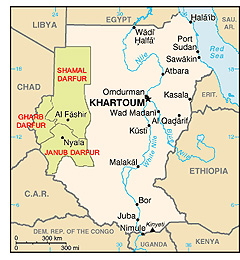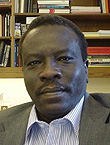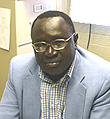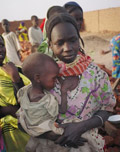A Symposium on the Darfur Catastrophe
Wednesday, March 7, 2007, 7:30 PM
Krannert Auditorium, Purdue University
Co-sponsored by the Purdue Department of History
Moderator: Ray Dumett, Professor of History, Purdue University
Participants:
Benaiah Yongo-Bure, Professor of Social Science, Kettering University
Ali Dinar, Outreach Director, African Studies Center, University of Pennsylvania
Karen Hirschfeld, Sudan Coordinator, Physicians for Human Rights
Background
At 967,000 square miles, the Sudan Republic is the largest country in Africa.
Darfur (literally, the 'Land of the Fur') is a province, about the size of the state of Texas in the western Sudan.
There are longstanding underlying economic and social causes of conflicts in the region based on demography, disputes over lands
between farmers and expanding cattle-herders, plus severe drought, leading to growing desertification.
But the catastrophe that we know today began in 2003 when rebel groups in Darfur, seeking greater representation for their region in
the national government at Khartoum began assaulting government targets.
In rapid response the national government, led by President Omar al-Bashir, launched a long series of brutal reprisals led by a paramilitary
group of mounted warriors, called the Janjaweed, which, in wave after wave, have burnt homes, disturbed the land and have pillaged,
killed and raped helpless villagers of this western region.
 These raids often have been supported by government troops and helicopters.
One conservative estimate last year listed the number of deaths in Darfur over three years at 70,000; but other estimates run as
high as 400,000, particularly if one includes, not only the direct murder of people by the Janjaweed,
but also the widespread famine caused by the uprooting of African farmers from their homelands and lost opportunities for planting
food crops with resulting widespread famine. Furthermore, an estimated 200,000 fleeing refugees from Darfur have sought safe haven in the
neighboring nation of Chad, to the West, leading to strained relations between the Sudan and that state.
Although some organizations, including the United Nations General Assembly, were reluctant to call these massacres--"Genocide,"
there is little doubt that this is exactly what has been taking place.
Thus far, a peace-keeping force of approximately 7,000 soldiers sent by the African Union, though able to engage in small-scale rescue
operations, have been insufficient to stop the region-wide wholesale killing.
These raids often have been supported by government troops and helicopters.
One conservative estimate last year listed the number of deaths in Darfur over three years at 70,000; but other estimates run as
high as 400,000, particularly if one includes, not only the direct murder of people by the Janjaweed,
but also the widespread famine caused by the uprooting of African farmers from their homelands and lost opportunities for planting
food crops with resulting widespread famine. Furthermore, an estimated 200,000 fleeing refugees from Darfur have sought safe haven in the
neighboring nation of Chad, to the West, leading to strained relations between the Sudan and that state.
Although some organizations, including the United Nations General Assembly, were reluctant to call these massacres--"Genocide,"
there is little doubt that this is exactly what has been taking place.
Thus far, a peace-keeping force of approximately 7,000 soldiers sent by the African Union, though able to engage in small-scale rescue
operations, have been insufficient to stop the region-wide wholesale killing.
President Bashir has steadfastly blocked international diplomatic pressures, led by the USA, to send in a large enough force of
United Nations troops to end the disaster.
Recently there has been talk by a minority in some international quarters about unilateral military intervention in the
Sudan by either the United States alone, or preferably by a NATO force, as in the Bosnia peace-keeping operations.
However, such actions raise serious questions concerning violations of national sovereignty.
Additional Resources
Wikipedia: Darfur Conflict
Sudan Research, Analysis, and Advocacy, Eric Reeves
Human Rights Watch: Crisis in Darfur
Darfur Information Center, University of Pennsylvania
Understanding Sudan, A Teaching and Learning Resource
BBC News Special Report: "Sudan: A Nation Divided",
extensive current information on the Darfur conflict can be found on the BBC News site by searching for "darfur conflict".
Participants
 |
Dr. Ali B. Ali-Dinar, obtained his BA and MA from the University of Khartoum, Sudan, and his Ph.D. in Folklore and Folklife from the
University of Pennsylvania in 1995.
Dr. Dinar works now as the Associate Director of the African Studies Center at the University of Pennsylvania.
He is the founder of "Darfur Information Center," an on-line source for information about Darfur region of western Sudan, and the current
President of the Sudan Studies Association, USA.
Dr. Dinar has spoken, quoted and interviewed widely by national and world media regarding the on-going conflict in Darfur.
His recent trip to Darfur was in October 2006.
|
 |
Karen Hirschfeld is the Sudan Coordinator for Physicians for Human Rights in Cambridge, MA.
She manages all aspects of the organization's programs in Sudan, including planning and implementing human rights investigations in
Sudan and Chad, as well as managing an on-going training grant with a Sudanese-based organization treating torture victims.
She co-wrote "Darfur- Assault on Survival," an evidence-based report arguing that the destruction of livelihoods by the
Sudanese Army and Janjaweed militias constitutes "genocide." Ms. Hirschfeld from 2002-2004 managed small-scale infrastructure projects
in rural villages in Afghanistan for the International Organization for Migration. She holds degrees from the economic development and
human rights program at Columbia University's School of International and Public Affairs.
|
 |
Professor Benaiah Yongo-Bure, was born in southern Sudan, received his B.A. degree from Makerere University,
Kampala Uganda and his M.A. and Ph.D. in economics from Dalhousie University in Nova Scotia, Canada.
He is presently Associate Professor of Economics at Kettering University, Flint, Michigan.
Among his other posts, he has served in the Ministry of Finance and Economic Planning for the Government of the Sudan;
and he recently returned from a field trip to the Sudan.
Several of his recent publications include:
"The Economic Development of the Southern Sudan" (2003),
"Towards National Integration in a Multiethnic Country: The Sudanese Experience" (1989) and "Islamism, Arabism,
and the Disintegration of Sudan," Journal of Northeast African Studies (1994).
|
|
|


 These raids often have been supported by government troops and helicopters.
One conservative estimate last year listed the number of deaths in Darfur over three years at 70,000; but other estimates run as
high as 400,000, particularly if one includes, not only the direct murder of people by the Janjaweed,
but also the widespread famine caused by the uprooting of African farmers from their homelands and lost opportunities for planting
food crops with resulting widespread famine. Furthermore, an estimated 200,000 fleeing refugees from Darfur have sought safe haven in the
neighboring nation of Chad, to the West, leading to strained relations between the Sudan and that state.
Although some organizations, including the United Nations General Assembly, were reluctant to call these massacres--"Genocide,"
there is little doubt that this is exactly what has been taking place.
Thus far, a peace-keeping force of approximately 7,000 soldiers sent by the African Union, though able to engage in small-scale rescue
operations, have been insufficient to stop the region-wide wholesale killing.
These raids often have been supported by government troops and helicopters.
One conservative estimate last year listed the number of deaths in Darfur over three years at 70,000; but other estimates run as
high as 400,000, particularly if one includes, not only the direct murder of people by the Janjaweed,
but also the widespread famine caused by the uprooting of African farmers from their homelands and lost opportunities for planting
food crops with resulting widespread famine. Furthermore, an estimated 200,000 fleeing refugees from Darfur have sought safe haven in the
neighboring nation of Chad, to the West, leading to strained relations between the Sudan and that state.
Although some organizations, including the United Nations General Assembly, were reluctant to call these massacres--"Genocide,"
there is little doubt that this is exactly what has been taking place.
Thus far, a peace-keeping force of approximately 7,000 soldiers sent by the African Union, though able to engage in small-scale rescue
operations, have been insufficient to stop the region-wide wholesale killing.



